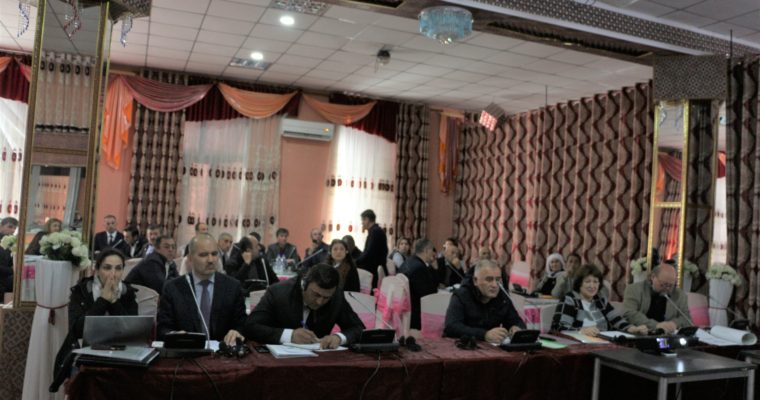Update from NADF’s implementation of Zarafshon Integrated Basin Programme, Landell Mills, funded by EU. The National Association of Dekhan Farms (
—
On 12 November 2019 in the Zarafshon valley of Tajikistan, took place a republican seminar on the subject of Implementation of Pasture Management in Tajikistan. A total of 47 stakeholder representatives, the rural farming communities, Pasture Users Unions attended the Seminar, from the EU-funded Rural Development Programme (RDP) in the Zarafshon valley, from the Pasture Trust of the Ministry of Agriculture (MOA), from the Caritas-Switzerland pasture project in Muminabad district, IFAD project in Khatlon region, NGO consortiums – WHH (Welthungerhilfe) and AKF.
Mark Witcomb, the Senior Advisor on Natural Resources Management & Community Development, Zarafshon Integrated Basin Project, (Landell Mills), funded by EU, as a moderator gave a little background information which is the ‘water part’ of the bigger EU-funded Rural Development Programme (RDP). He explained that Landell Mills’ main role is promoting a river basin/Integrated Water Resources Management (IWRM) approach in the Zarafshon valley, working mainly under the Ministry of Energy and Water Resources (MEWR). Another role of Landell Mills is providing technical support and coordination to NGOs working in the upper catchment areas under the broader RDP. There are two NGO consortiums – one led by AKF works in the Eastern part of the Zarafshon Basin (towards Mastchoh) and the other led by WHH, working in the Western part of the Basin (towards Panjakent). Both consortiums are implementing pasture and forest management projects in their catchments and have established Pasture Users Unions (PUUs) / Management Committees and are working with communities in developing Pasture Management Plans (PMPs).
The presentation started by the Head of the Pasture Trust, providing a general overview of the current status of pasture management in Tajikistan and the challenges faced. There was then a panel-led discussion moderated by Mark Witcomb from Landell Mills – on the four-person panel was Arabela Philipona (Caritas-Switzerland), Joachim Bönisch (WHH), Rano Mansurova (ACTED) and Safarali Nazarov (Pasture Trust).
The event can overall be considered a great success with lively question and answer sessions following each presentation and the afternoon panel-led discussion also saw a lively debate which drew out a number of key issues to be considered for the future discussion.
The Republican Seminar was also an excellent opportunity for rural farming community representatives from different parts of Tajikistan to realize that many of the challenges they face are shared challenges, and to think about possible shared solutions. It was also an opportunity to discuss the new Law on Pastures and the practicalities of implementation of the new law on the ground, sometimes in remote mountainous areas, and the institutional structures required to achieve this.
The main aims of the Seminar were:
- Discussion between different stakeholder groups about pasture management – challenges and opportunities, and learning from the Caritas-Switzerland project in Muminabad, and the IFAD project in Khatlon region;
- To link policy and reform in the centre with the practical realities of implementation on the ground.
The list of potential discussion topics in the Seminar were:
- PUU’s (Pasture Users Union) taxation and registration;
- Transhumance routes for livestock (village/district/region level);
- Pasture Users Unions (PUU), management plans and pasture inventories;
- Pasture rotation plans;
- Creation of PUUs/Associations at the level of one or more villages or sub basins;
- Stability of PUU/Association activities;
- Pasture capacity and the increase in livestock numbers;
- Methods of reducing pasture degradation;
- Women`s role on pasture committees and PUUs;
- Commission of pasture (activities and membership);
- Improvement and use of seasonal pastures;
- Development hay making area, stocks of pasture fodder crops;
- Pasture infrastructure development and maintenance.
The Panel-led discussion include the following topics/issues:
- How to make the new Pasture Law (2019) more widely understood & implemented, that can bring more benefit for Rural Communities?
- How to better integrate the water reform with the agriculture reform?
- How to address the issue of increasing livestock numbers (and limited pasture areas)?
- The issue of migration/transhumance – how to include pastoralists in the Pasture Management Plans?
- The role of women in decision making positions concerning pasture management and use.
- How to make the new Pasture Law (2019) more widely understood & implemented?
- How to link PUUs with policy-makers at the national level? (Inc. role of National Association of Pasture Users)
- How to better integrate the water reform with the agriculture reform.




Comments are closed